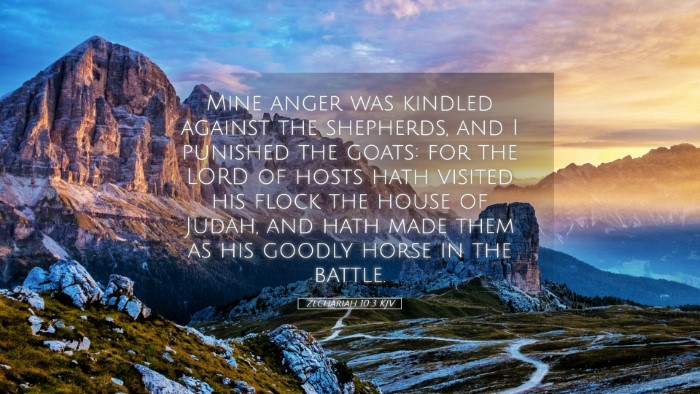Old Testament
Genesis Exodus Leviticus Numbers Deuteronomy Joshua Judges Ruth 1 Samuel 2 Samuel 1 Kings 2 Kings 1 Chronicles 2 Chronicles Ezra Nehemiah Esther Job Psalms Proverbs Ecclesiastes Song of Solomon Isaiah Jeremiah Lamentations Ezekiel Daniel Hosea Joel Amos Obadiah Jonah Micah Nahum Habakkuk Zephaniah Haggai Zechariah MalachiZechariah 10:3
Zechariah 10:3 KJV
Mine anger was kindled against the shepherds, and I punished the goats: for the LORD of hosts hath visited his flock the house of Judah, and hath made them as his goodly horse in the battle.
Zechariah 10:3 Bible Commentary
Commentary on Zechariah 10:3
Zechariah 10:3 states: "Mine anger was kindled against the shepherds, and I punished the goats: for the LORD of hosts hath visited his flock the house of Judah, and hath made them as his goodly horse in the battle."
Introduction
This verse is rich with meaning, addressing the themes of divine judgment, pastoral leadership, and the restoration of God's people. Through a synthesis of insights from various public domain commentaries, we explore the implications of this passage for contemporary believers and leaders.
Contextual Overview
Zechariah, a post-exilic prophet, seeks to encourage the Israelites in their rebuilding efforts after the Babylonian exile. His message combines both hope and admonition, emphasizing the sovereignty of God over Israel's history. This particular verse captures a moment of divine discontent directed towards Israel's leaders, contrasting their failures with God's faithful care for His flock.
Divine Anger Against the Shepherds
The phrase, "Mine anger was kindled against the shepherds," reveals God's displeasure with the leaders of Israel. Matthew Henry notes that the shepherds here symbolize the rulers and religious leaders whose negligence has led the people astray. This sentiment echoes throughout Scripture, where the expectation of shepherds is to care for their flock, guiding them with wisdom and integrity.
Albert Barnes elaborates that the 'shepherds' here can also be interpreted as both civil and ecclesiastical leaders who failed in their duties. Their incompetence provoked God's wrath and left the people vulnerable, echoing the broader biblical theme that leaders will be held accountable for their actions.
Judgment on the Goats
In conjunction with divine anger towards the shepherds, the text states, "I punished the goats." Adam Clarke draws attention to the metaphorical use of 'goats,' suggesting they may represent a stubborn and rebellious element among the people. Just as in pastoral settings, goats are often seen as unruly and prone to causing disruption, this highlights the chaotic state of the nation under poor leadership.
The punishment of the 'goats' illustrates that there will be consequences for the actions of both leaders and followers, emphasizing a community’s collective responsibility. The metaphor serves to remind church leaders today of the impact of their governance on the spiritual well-being of their congregants.
God’s Relationship with His People
Despite the failures of the shepherds, God's interaction with His people is one of engagement and care. The text states, "for the LORD of hosts hath visited his flock the house of Judah." This brings a reassuring message of hope. Although leaders may err, God remains faithful to His covenant promises.
Henry posits that God’s visitation signifies His direct intervention in the cares and concerns of His people. This action demonstrates that God is not distant but very much involved, guiding His flock towards renewal and strength.
The Flock as a Goodly Horse
The concluding portion of the verse, "and hath made them as his goodly horse in the battle," suggests God's intention to equip His people for victory. Horses in ancient battles represented strength and valor. Barnes interprets this as a metaphor for God's empowerment of Judah, indicating that God would strengthen and embolden His people for the challenges ahead.
This empowerment signals a restoration of Israel's former glory and a divine reconstitution of their identity as a powerful nation under God’s direction. Clarke suggests that this imagery serves to motivate believers to rely on God for strength and assurance in facing their challenges.
Implications for Spiritual Leadership
From this passage, one can derive profound lessons regarding spiritual leadership. Shepherds today must recognize their role as stewards of God's flock and aspire to fulfill their responsibilities faithfully. The admonition toward the shepherds serves as a contemporary warning against complacency and incompetence in leadership roles within the church.
- Accountability: Just as Israel's leaders faced God's judgment, so too should modern leaders understand that they are ultimately accountable to God for their actions and decisions.
- Vigilance: The church must remain vigilant against becoming complacent or negligent, ensuring that they guide their congregants in ways that reflect God's will.
- Empowerment: Leaders should seek God's empowerment to serve effectively, trusting in His ability to transform and equip His people for their mission.
Conclusion
Zechariah 10:3 serves as a powerful reminder of God’s sovereignty over His people and His expectations of their leaders. The themes of divine judgment, responsibility, and restoration remind us that God is tirelessly working to bring about His purposes, even amid human failure. For pastors, students, theologians, and Bible scholars, this verse encourages reflection on both the nature of leadership and the importance of seeking divine empowerment in fulfilling God’s calling.


